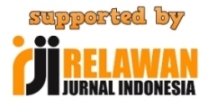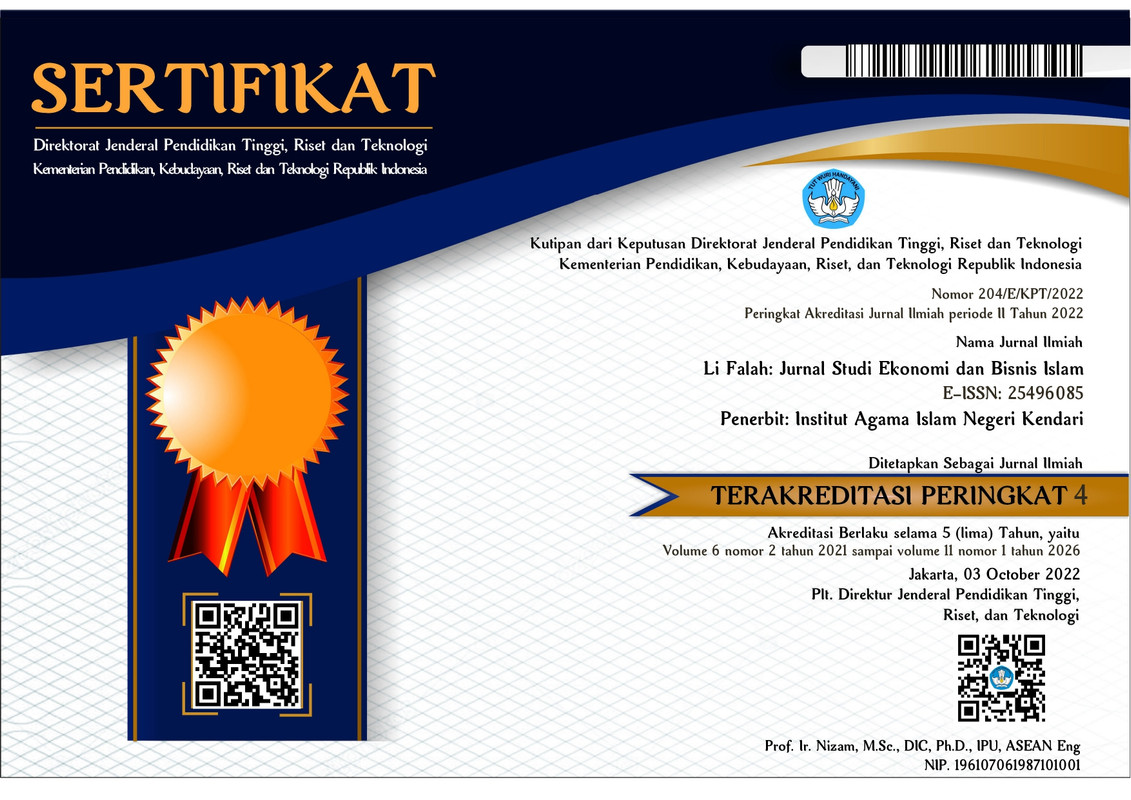Fintech Waqf for MSMEs Empowerment in Indonesia
Abstract
Keywords
Full Text:
PDFReferences
Afdi, Zihramna dan Purwanggono, Bambang. 2017. “Perancangan Strategi Berbasis Metodologi Lean Startup untuk Mendorong Pertumbuhan Perusahaan Rintisan Berbasis Teknologi di Indonesia”. Industrial Enginerering Online Journal UNDIP Vol. 6 No. 4
Ahmed, Umar, Omar M. Mustafa, and Ahamad Faosiy Ogunbado. "Examining the Traditional Waqf-Based Financing Methods and Their Implications on Socioeconomic Development." IOSR Journal of Business and Management (IOSR-JBM) 17, no. 2 2015): 119–25. https://doi.org/10.9790/487X-17210106.
al Arif, M. N. R. (2012). Wakaf uang dan pengaruhnya terhadap program pengentasan kemiskinan di Indonesia.
Amalia, E. (2008). PotensidanPersoalan LKMS/BMT BagiPenguatan UKM dalam Kerangka Keadilan DistributifEkonomi Islam (Studi LKMS/BMT di 6 Kota PulauJawa). Surabaya: Universitas Airlangga.
Aminu, S. O., Mohsin, M. I. A., & Taib, F. M. (2018). An empirical review of the waqf horizon through Fintech: the industry 4.0 wave. International Journal of Economics and Management Engineering, 12(7).
Az-Zuhaili, W. (2011). Fiqih Islam wa adillatuhu, terj. Abdul Hayyie Al-Kattani, Dkk, Jakarta: Gema Insani.
Bakar, Ridzwan. 2018. "Cash Waqf for education: Prospects and challenges." Journal of Emerging Economies and Islamic Research (2018) Vol. 6, No. 2 Blank, S., 2013. "Why The Lean Start-Up Changes Everything". Harvard Business Review. Diakses pada September 2018 (https://hbr. org/2013/05/why-the-lean-start-up-changeseverything)
dalam Sugiyono, S. (2017). Metode Penelitian Kuantitatif, Kualitatif, dan R&D. Bandung: Alfabeta, CV.
Hasan, H. A. (2020). DAMPAK TEKNOLOGI DALAM TRANSAKSI BISNIS UMKM. PILAR, 11(2), 52–63.
Indonesia, B. (2015). Profil Bisnis Usaha Mikro Kecil dan Menengan (UMKM). jakarta: Lembaga Pengembangan Perbankan Indoensia kerjasama dengan Bank Indonesia.
Kasanah, N. (2019). Wakaf Uang Dalam Tinjauan Hukum, Potensi, Dan Tata Kelola. Muslim Heritage, 4(1).
Kirby, E., & Worner, S. (2014). Crowd-funding: An infant industry growing fast. IOSCO Research Department, 1–63.
Makarim, E. (2006). Pengantar hukum telematika: Suatu kompilasi kajian.
Rachman, M. A., & Salam, A. N. (2018). The reinforcement of zakat management through financial technology systems. International Journal of Zakat, 3(1), 57–69.
Romanova, I., & Kudinska, M. 2016. Contemporary Issues in Finance: Banking and FinTech: A Challenge or Opportunity?. London: Emerald Group Publishing Limited.
Saptono, I. T. (2019). Peluang dan Tantangan Wakaf di Era 4.0. Majalah Insight Buletin Ekonomi Syariah Menangkap Peluang Tren Wakaf Produktif KNKS.
Sifa, Eka Nurhalimatus. 2016. E-Waqf as an Alternative Solution for Infrastructure Development Based on Crowd-funding. Muhammadiyah University of Metro: The First International Conference on Law, Economics and Education.
Siregar, 2016. “Financial Technology Tren Bisnis Keuangan ke Depan”. Accessed in 1 Oktober 2022 di (http://infobanknews.com).
Tarmizi, E. (2020). Harta Haram Muamalat Kontemporer Cetakan ke-23. Kota Wisata, Bogor: Berkat Mulia Insani.
Winarto, W. W. A. (2020). Peran Fintech dalam Usaha Mikro Kecil dan Menengah (UMKM). Jesya (Jurnal Ekonomi Dan Ekonomi Syariah), 3(1), 61–73.
Yeow, A., Chuen, D. L. K., Tan, R., & Chia, M. (2018). Indonesian Microfinance Institutions (MFI) move to technology–TBOP's prodigy experience. In Handbook of Blockchain, Digital Finance, and Inclusion, Volume 2 (pp. 431–449). Elsevier.
Zakariya, A. F. (2020). Pemberdayaan Nelayan dalam Mambangun Kekuatan Ekonomi Melalui Kegiatan Produk Pengolahan Ikan Di Desa Karangagung. Islamic Management and Empowerment Journal, 2(2), 133–150.
DOI: http://dx.doi.org/10.31332/lifalah.v7i2.5339
Copyright (c) 2022 Aulia Muannasa

This work is licensed under a Creative Commons Attribution-ShareAlike 4.0 International License.
Li Falah : Jurnal Studi Ekonomi dan Bisnis Islam, Indexed In
Accredited By
View My Stats
Organized by : Fakultas Ekonomi dan Bisnis Islam
Published by : Institut Agama Islam Negeri Kendari
Jl. Sultan Qaimuddin No. 17 Baruga Kota Kendari Provinsi Sulawesi Tenggara
phone. +62401-3193710
Fax. +62401-3193710
Email: [email protected]



















